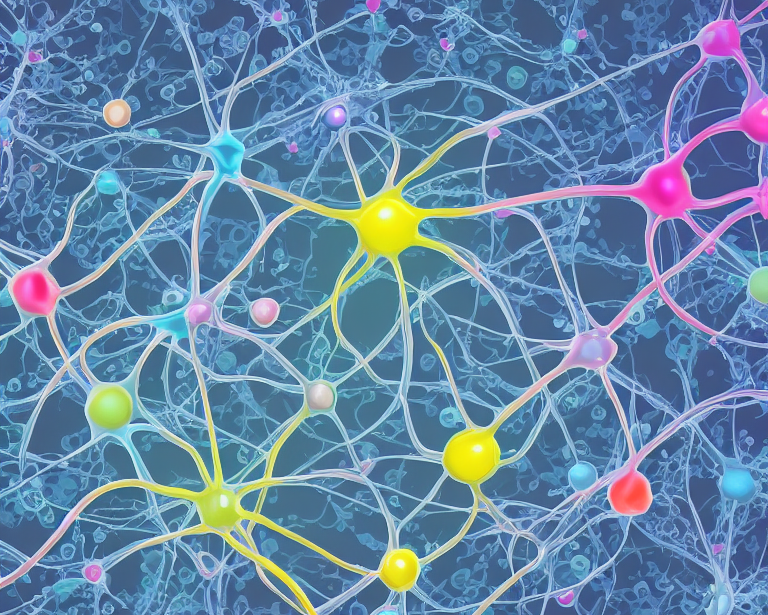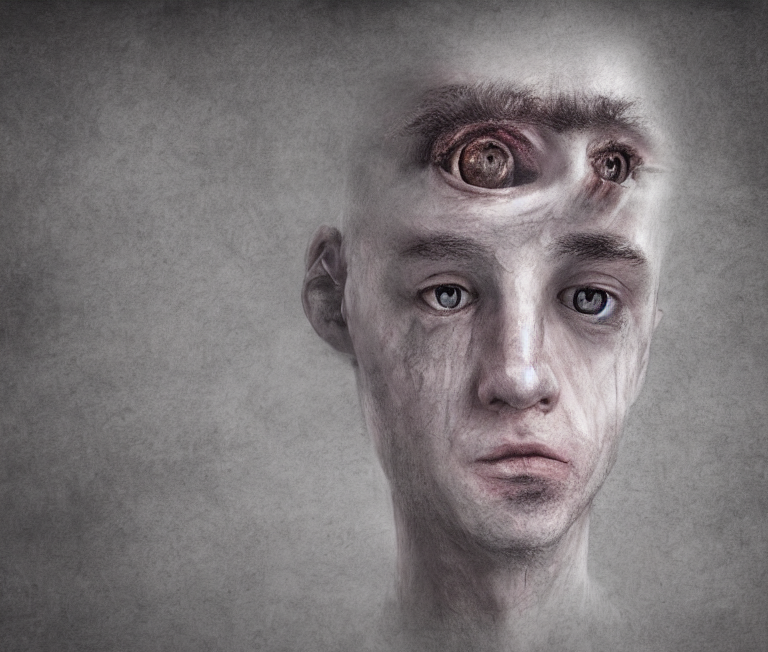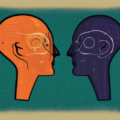Psychosis is a mental health condition characterized by a disconnection from reality. In some cases, psychosis can be caused by an underlying medical condition or the use of certain drugs.
In this article, we will focus mainly on psychoses that are a consequence of substance use. And therefore situations when someone near you falls into a psychotic state, and what should be done during First Aid for Psychosis in such a situation.
What is Psychosis?

Psychosis is a complex mental health condition in which an individual experiences a loss of contact with reality. People with psychosis may experience hallucinations, delusions, disordered thinking, and abnormal behaviors. This condition is also called Psychotic State.
Psychosis can be caused by several factors, including mental health disorders such as schizophrenia and bipolar disorder, medical conditions such as brain tumors or infections, or substance abuse, particularly with drugs that can affect brain function.
Psychoactive Substances and Psychosis

Psychoactive substances are chemicals that can alter an individual’s mental state, mood, or behavior. Some of these substances have the potential to cause psychosis. Both one-time and long-term intake of certain psychoactive substances can provoke psychotic episodes. Here is an approximate list of the most popular but not all substances that can cause psychosis:
- Stimulants
- Amphetamines (e.g., methamphetamine, MDMA): These can cause amphetamine-induced psychosis, characterized by paranoia, hallucinations, and delusions. The risk of psychosis increases with higher doses and long-term use.
- Cocaine: Cocaine-induced psychosis can manifest as paranoia, hallucinations, and aggressive behavior. The risk increases with higher doses and long-term use.
- Methamphetamine, Methedrone, Alpha-PVP – all of them.
- Hallucinogens
- LSD (lysergic acid diethylamide): LSD can cause hallucinogen-induced psychosis, characterized by hallucinations, delusions, and thought disturbances. The risk is higher for individuals with a predisposition to mental health disorders.
- Psilocybin (magic mushrooms): Similar to LSD, psilocybin can lead to hallucinogen-induced psychosis, especially in those with a predisposition to mental health issues.
- DMT and others.
- Cannabinoids
- Marijuana (THC): High doses of THC, the main psychoactive compound in marijuana, can cause transient psychosis in some individuals. Long-term use may increase the risk of developing chronic psychotic disorders, particularly in those with a genetic predisposition.
- Synthetic Cannabinoids
- Spice, K2: These synthetic compounds can cause severe psychotic symptoms, including paranoia, hallucinations, and delusions. The risk of psychosis is higher compared to natural marijuana due to the unpredictable potency of these substances.
- Dissociative drugs like PCP and ketamine – These drugs can cause psychotic symptoms that persist even after the drug has worn off, especially with high doses. Repeated use increases the risk of chronic psychosis.
- Deliriants like DPH (Benadryl) and Datura – These substances are known to frequently cause psychotic delusions, hallucinations, and confusion that can persist for days. Even a single use at a high enough dose can result in a psychotic episode.
How Do I Know If Someone May Be Developing Psychosis?

It can be difficult to know if someone is developing psychosis, as the symptoms can vary depending on the individual and the underlying cause of the condition. However, there are some signs and symptoms that may indicate the development of psychosis, including changes in:
Behavior: The person may become more socially withdrawn or appear more agitated or irritable than usual.
Thinking: The person may have difficulty concentrating, may have disorganized or illogical thinking, or may express ideas that are not based in reality.
Emotions: The person may experience intense emotions, such as anxiety or paranoia, or may appear to have a flat affect or reduced emotional expressiveness.
Perception: The person may experience hallucinations, such as hearing voices or seeing things that are not there.
Sleep Patterns: The person may have difficulty sleeping or may experience nightmares.
If you suspect that someone is developing psychosis, it is important to encourage them to seek professional help as soon as possible. Early intervention and treatment can improve the chances of a positive outcome and reduce the risk of complications. You can also reach out to mental health resources in your community for guidance on how to help someone who may be experiencing psychosis.
Common Significances And Symptoms Of Psychosis

These symptoms of psychosis can vary in severity and frequency depending on the individual and the underlying cause of the psychosis. Some symptoms are more characteristic of chronic mental disorders, and some are for acute conditions caused by psychoactive substances. Anyway, the most common symptoms include:
Hallucinations: Seeing, hearing, feeling, or smelling things that are not actually present. The most common type of hallucination experienced in psychosis is hearing voices.
Delusions: Having false beliefs that are not based on reality, such as believing that someone is trying to harm you or that you have special powers or abilities.
Disorganized thinking: Difficulty organizing thoughts, communicating coherently, or making logical connections between ideas.
Abnormal behavior: Engaging in behavior that is unusual or inappropriate, such as laughing or crying for no apparent reason, pacing, or exhibiting agitation or aggression.
Reduced emotional expression: Having a flat affect, or reduced emotional expressiveness, making it difficult for the person to convey their emotions or connect with others emotionally.
Poor motivation: Difficulty initiating and completing tasks, lack of interest or motivation, and reduced energy.
Cognitive impairment: Difficulty with memory, attention, and other cognitive functions that can affect daily functioning.
First Aid

First Aid Recommendations for Psychosis involves addressing immediate safety concerns and connecting the person to appropriate mental health services. Here are some approaches that may be used:
- Ensure safety: The person’s safety, as well as your own, is crucial. Create a calm and non-threatening environment by removing any potential sources of danger or agitation.
- Do not leave the person if they are experiencing symptoms of psychosis. Stay with them until medical assistance arrives or until the person’s condition improves. And even when help arrives, it is better to stay with the person, because he may experience fear, confusion, and misunderstanding of what is happening. You may be the only familiar factor for them.
- Stay calm and reassuring: Speak softly and calmly to the person, using a reassuring tone. Let them know that you are there to help and that they are not alone.
- Maintain boundaries: Respect the person’s personal space and avoid physical contact unless necessary for their safety. Be aware that they may be experiencing sensory overload and could perceive touch as threatening.
- Listen actively to what the person is saying, even if it seems illogical or impossible. Do not argue or attempt to convince the person that their beliefs are wrong.
- Avoid arguing or challenging delusions: Trying to convince the person that their beliefs or hallucinations are not real may escalate the situation. Instead, focus on validating their feelings without endorsing or reinforcing their delusions.
- Help the person identify their emotions and provide them with coping strategies to manage their feelings.
- Reduce stimuli: Minimize noise, bright lights, and other sensory inputs that could exacerbate their symptoms. Move to a quiet and calm environment, if possible.
- Engage emergency services if needed: If the person is a danger to themselves or others, or if they are unable to care for their basic needs, consider calling emergency services to ensure their safety and access to appropriate medical care.
- Encourage professional help: People experiencing psychosis often require professional treatment to manage their symptoms effectively. Encouraging them to seek help from a mental health provider or emergency medical services is important for their recovery.
Remember, these recommendations are not a substitute for professional medical advice. If you encounter someone experiencing psychosis, it is essential to involve trained medical professionals as soon as possible to ensure appropriate care and support.
How to Approach Someone Who May be in Psychosis?

Approaching someone who may be experiencing psychosis can be challenging, but there are some general guidelines that may help:
Remain calm and non-judgmental: People experiencing psychosis may be frightened or confused, and approaching them in a calm and non-judgmental manner can help to reduce their anxiety and establish trust.
Use clear and simple language: People experiencing psychosis may have difficulty processing complex information or following a conversation with multiple threads. Using clear and simple language can help them to understand and respond to what you are saying.
Respect their boundaries: People experiencing psychosis may feel threatened by unfamiliar or intrusive situations, so it’s important to respect their boundaries and avoid making sudden movements or gestures.
Provide reassurance and support: People experiencing psychosis may feel isolated or overwhelmed. Providing reassurance and support can help them to feel less alone and more understood.
Offer to help them seek professional help: People experiencing psychosis often require professional treatment to manage their symptoms effectively. Offering to help them seek professional help, such as contacting a mental health provider or emergency services, can be a crucial step in their recovery.
How to Talk to the Person in Psychosis?

When talking to someone who may be experiencing psychosis, it’s important to approach the conversation with sensitivity and empathy.
Use active listening. People experiencing psychosis often feel unheard or misunderstood. Using active listening techniques, such as summarizing what they have said or reflecting back their emotions, can help them to feel more validated and understood.
Be respectful and non-judgmental. People experiencing psychosis may have beliefs or experiences that are different from your own. It’s important to approach the conversation with an open mind and avoid being dismissive or judgmental.
Offer support and encouragement. Recovery from psychosis can be a challenging and lengthy process. Offering support and encouragement can help to bolster their confidence and motivation.
Remember, talking to someone who may be experiencing psychosis can be challenging, and it’s important to prioritize their safety and well-being.
Things to Avoid if You Suspect Psychosis

If you are interacting with someone who may be experiencing psychosis, there are several things you should avoid doing to prevent making their symptoms worse or escalating the situation. These include:
Arguing or challenging their delusions or hallucinations: While it may be tempting to try to reason with someone who is experiencing psychosis, it’s important to remember that their beliefs are real to them. Arguing or challenging their experiences can increase their distress and may make them feel more isolated and misunderstood.
Being confrontational or threatening: People experiencing psychosis can be very sensitive to their environment and may become agitated or frightened by perceived threats. It’s important to remain calm and reassuring when interacting with them and to avoid confrontational or threatening behavior.
Making sudden movements or gestures: Sudden movements or gestures can be perceived as threatening or frightening to someone who is experiencing psychosis. It’s important to move slowly and deliberately when interacting with them to avoid triggering a fear response.
Using drugs or alcohol around them: Drugs and alcohol can exacerbate the symptoms of psychosis and can increase the risk of complications. It’s important to avoid using these substances around someone who may be experiencing psychosis.
Leaving them alone: People experiencing psychosis can feel very isolated and vulnerable. It’s important to stay with them and provide reassurance and support until professional help arrives.
Other Tips For Communicating
Avoid using jargon or technical terms: People experiencing psychosis may not be familiar with technical or medical terminology. Using simple and easily understandable language can help to improve communication and reduce confusion.
Check for understanding: People experiencing psychosis may have difficulty retaining information or may be easily distracted. Checking for understanding and repeating key points can help to ensure that your message is received and processed.
Be respectful and empathetic: People experiencing psychosis may feel misunderstood or stigmatized. Being respectful and empathetic can help to establish trust and improve communication.
Provide written or visual aids: People experiencing psychosis may have difficulty remembering or processing information verbally. Providing written or visual aids, such as pamphlets or diagrams, can help to reinforce key points and improve communication.
ALGEE: When someone is experiencing a psychotic state next to you, it can be too unusual, disturbing, and even scary. At such moments, all the knowledge can evaporate from your head, and you will not be able to effectively help a person. To reduce the chances of such a scenario, you can use a mnemonic technique. It will help you remember the main and most important stages of first aid for psychosis. So, ALGEE is
- Assess for risk of suicide or harm
- Listen non-judgmentally
- Give reassurance and information
- Encourage appropriate professional help
- Encourage self-help and other support strategies
Summary

Psychosis is a mental health condition characterized by a loss of contact with reality, including delusions and hallucinations. It can be caused by a range of factors, including genetics, substance abuse, and stress.
First aid for psychosis involves addressing immediate safety concerns and connecting the person to appropriate mental health services. This includes creating a safe environment, reducing external stimuli, controlling behavior, calm, empathic, simple, and kind communication, and supporting a person before the arrival of medical professionals and even after that.
In many of the cases we are considering, the psychotic state is temporary and reversible. However, in any case, this is a difficult test for the consciousness and psyche of a person. And the speed of recovery, as well as the presence of consequences and post-effects, directly depends on how a person is helped in the first hours of the development of a psychotic state.
✔️
This marks the finish of today’s session. It is my hope that this piece was enlightening.
If you desire to advance the growth of this blog, I suggest the following actions:
- Follow my Twitter.
- Circulate a link to this article among your associates.
- Give recognition to this blog on relevant platforms or discussion groups.
Should you identify any necessary additions or corrections in this article, feel free to initiate a dialogue with me via Contact Form. I am always open to communication.
I appreciate your valuable time and consideration.👽





Thanks for sharing. I read many of your blog posts, cool, your blog is very good.